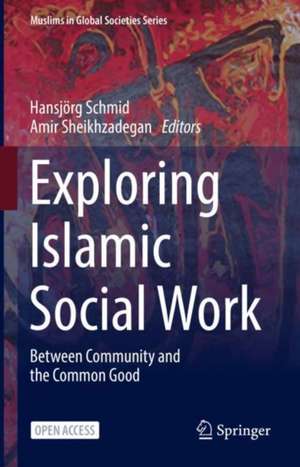Exploring Islamic Social Work: Between Community and the Common Good: Muslims in Global Societies Series, cartea 9
Editat de Hansjörg Schmid, Amir Sheikhzadeganen Limba Engleză Paperback – 22 mai 2022
| Toate formatele și edițiile | Preț | Express |
|---|---|---|
| Paperback (1) | 355.13 lei 43-57 zile | |
| Springer International Publishing – 22 mai 2022 | 355.13 lei 43-57 zile | |
| Hardback (1) | 428.84 lei 43-57 zile | |
| Springer International Publishing – 22 mai 2022 | 428.84 lei 43-57 zile |
Preț: 355.13 lei
Nou
Puncte Express: 533
Preț estimativ în valută:
67.98€ • 73.86$ • 57.14£
67.98€ • 73.86$ • 57.14£
Carte tipărită la comandă
Livrare economică 21 aprilie-05 mai
Preluare comenzi: 021 569.72.76
Specificații
ISBN-13: 9783030958824
ISBN-10: 3030958825
Pagini: 284
Ilustrații: XII, 284 p.
Dimensiuni: 155 x 235 mm
Greutate: 0.42 kg
Ediția:1st ed. 2022
Editura: Springer International Publishing
Colecția Springer
Seria Muslims in Global Societies Series
Locul publicării:Cham, Switzerland
ISBN-10: 3030958825
Pagini: 284
Ilustrații: XII, 284 p.
Dimensiuni: 155 x 235 mm
Greutate: 0.42 kg
Ediția:1st ed. 2022
Editura: Springer International Publishing
Colecția Springer
Seria Muslims in Global Societies Series
Locul publicării:Cham, Switzerland
Cuprins
Chapter 1. Islamic Social Work – An Introduction.- Chapter 2. The Maqāṣid-cum-maṣlaḥa Approach as Theological Basis of Islamic Social Work. A Critical Analysis and an Alternative Proposal.- Chapter 3. Islamic Social Ethics, Social Work and the Common Good: Learning from the European Context.- Chapter 4. Social Work through the Prism of the Religious Facts. Islam in Questions.- Chapter 5. Islamic Social Work. A Potential Response to Marginalisation.- Chapter 6. Human Dignity, Common Good and Social Welfare: Towards an Islamic Relational Social Ethics.- Chapter 7. Family Counselling as a Field of Islamic Social Work.- Chapter 8. Helping the Muslims or Contributing to Society? Insight into the Paradoxes of Islamic Social Work through Concrete Cases linked to Social Exclusion.- Chapter 9. The Religious Community. A Space that Facilitates Successful Resettlement for Muslim Offenders.- Chapter 10. Facing Radicalisation: Islamic Counter-Speech and Social Work.- Chapter 11. Social Work andCounter-Radicalisation. A Critical Reflection.- Chapter 12. Islamic Practical Theology: A Socio-ethical and Interdisciplinary Approach.- Chapter 13. “Epistemic Weight” of Praxis in the Production and Teaching of New Knowledge in Islamic Practical Theology.
Notă biografică
Hansjörg Schmid is director of the Swiss Center for Islam and Society and professor for interreligious ethics at the University of Fribourg, he was the founder and coordinator of the Theological Forum Christianity – Islam, his research is focused on interreligious social ethics and on Muslims in European societies with a focus on chaplaincy and social work.
Amir Sheikzadegan, PhD in Sociology from the University of Zurich, is a senior researcher both at the Department of Social Work, Social Policy and Global Development of the University of Fribourg. Topics of his research include Islam between tradition and modernity, political Islam, narrative identity, civic engagement, spiritual care, and qualitative social research.
Amir Sheikzadegan, PhD in Sociology from the University of Zurich, is a senior researcher both at the Department of Social Work, Social Policy and Global Development of the University of Fribourg. Topics of his research include Islam between tradition and modernity, political Islam, narrative identity, civic engagement, spiritual care, and qualitative social research.
Textul de pe ultima copertă
This open access book addresses, for the first time, Islamic social work as an emerging concept at the interface of Islamic thought and social sciences. Applying a multidisciplinary approach it explores, on the one hand, the discourse that provides religious legitimisation to social work activities and, on the other hand, case studies of practical fields of Islamic social work including educational programmes, family counselling, and resettlement of prisoners. Although in many cases, these activities are oriented towards Muslim clients, more often than not they go beyond the boundaries of Muslim communities to benefit society as a whole. Muslim actors are also starting to professionalise their services and to negotiate the ways in which they can become fully recognised service-providers within the welfare state. At a more general level, the volume also shows that in contrast to the widespread processes of secularisation of social work and its separation from religious communities, newtypes of activities are now emerging, which bring back to the public arena both an increased sensitivity to the religious identities of the beneficiaries and the religious motivations of the benefactors. The edited volume will be of interest to researchers in Islamic Studies, Social and Political Sciences, Social Work, and Religious Studies.
This is an open access book.
Caracteristici
This book is open access, which means that you have free and unlimited access Focus on Muslim social services that go beyond Muslim clients to also address the needs of the wider society A post-secular, interdisciplinary approach to social work linking theological reflection with social scientific insights Features cross country comparisons to Islamic work










